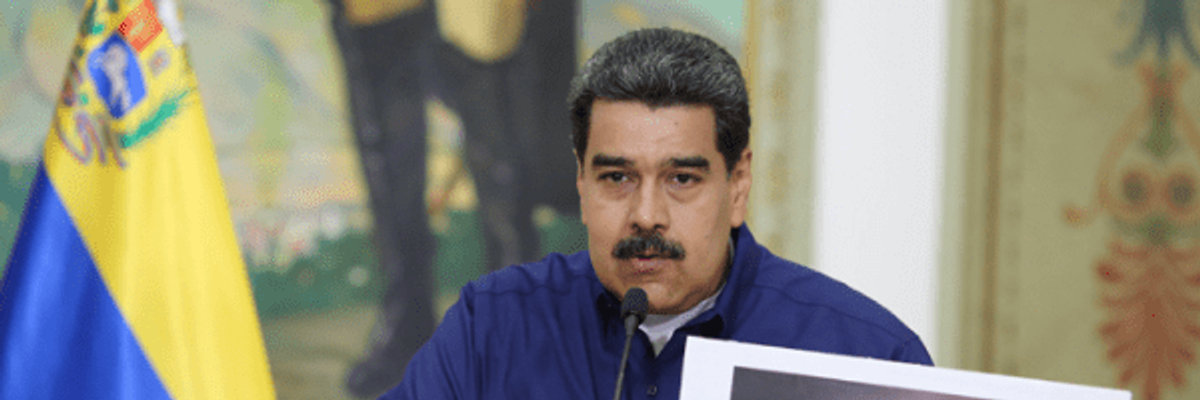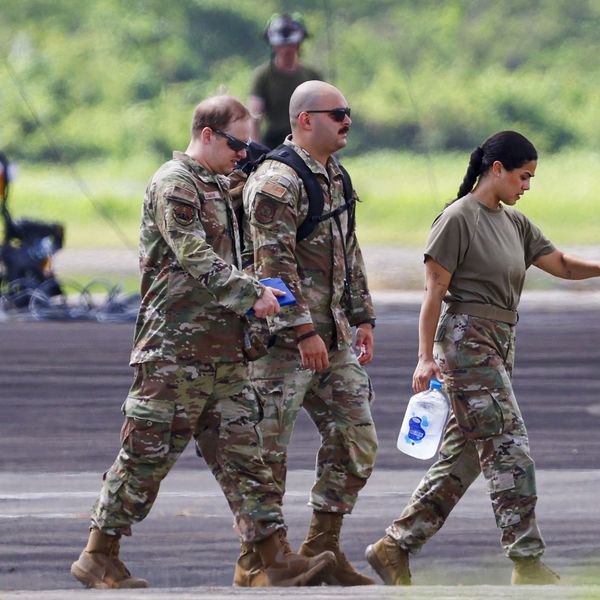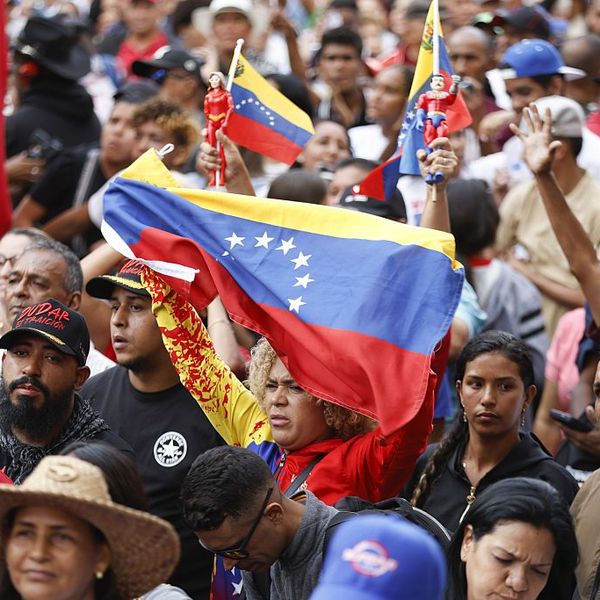
Venezuela's President Nicolas Maduro at Miraflores Palace in Caracas, Venezuela March 11, 2019. (Photo: Miraflores Palace via Reuters)
Escalation Fears Grow in Venezeula as Guaido Signals Support for Foreign Intervention and US Withdraws Diplomats
Pompeo's announcement that the U.S. embassy in Caracas will be vacated came as Juan Guaidó said he may support foreign intervention in Venezuela
Concerns over the Trump administration's increasingly hostile policy in Venezuela grew Tuesday after Secretary of State Mike Pompeo announced the U.S. was withdrawing all diplomatic personnel from the country.
Pompeo cited the "deteriorating situation" in Venezuela that escalated in January after the U.S. recognized opposition leader Juan Guaido as "interim president," rebuking President Nicolas Maduro and coordinating efforts to overthrow the elected government.
\u201cPompeo announces US pulling out all diplomats from #Venezuela\u201d— Josh Lederman (@Josh Lederman) 1552362837
\u201cThe presence of embassy staff in Venezuela is a "constraint" on US policy? That sounds very regime changey to me. Buckle up just in case.\u201d— HawaiiDelilah\u2122 (@HawaiiDelilah\u2122) 1552363511
\u201c@AP The US *intentionally created* that "deteriorating situation" in Venezuela, which is why it is withdrawing its embassy staff. This is a criminal US war of aggression, suffocating and strangling Venezuela and its people to try to make their country collapse\nhttps://t.co/zsieeaJh4U\u201d— The Associated Press (@The Associated Press) 1552364277
Meanwhile, Guaido told Fox Business Network on Monday that he plans to invoke Venezuela's constitutional Article 187, which he claimed "allows for an outside country to cooperate or to assist Venezuela in this sense."
"As we've stated in this article of our Constitution, which empowers me, as the person in charge, to employ whatever measures are necessary to enact this cooperation and this assistance for Venezuela," Guaido told "Trish Regan Primetime."
Both Guaido's escalated rhetoric and Pompeo's move came days before a planned rally outside the White House, where thousands of Americans are expected to protest a potential military invasion and regime change in Venezuela.
Most recently, a power outage that has gone on for five days has led the U.S. to accuse Maduro of failing to run his country effectively--even amid reports in the New York Times that the sanctions the U.S. has imposed in recent weeks are to blame for the blackouts, as Venezuela's access to fuel for power plant operations has been cut off.
"Maduro, along with Minister of Communication Jorge Rodriguez, continue to provide evidence that Pompeo and the U.S. authorities were the masterminds behind this very 'situation', pulling off a cyber attack on the state electric company's computer system at the El Guri hydroelectric plant resulting in the near nationwide power outage," reported teleSUR English Tuesday.
The U.S. reduced its diplomatic staff in Caracas in January after recognizing Guaido. Since then, relations between the two countries have grown increasingly strained and the Trump administration has repeatedly falsely blamed Maduro for the "deteriorating situation"--accusing him of burning aid trucks which were actually set ablaze by Guaido's supporters and calling him a "tyrant" for blocking so-called "humanitarian aid."
Over the fierce objections of Maduro, the Trump administration sent an aid convoy in mid-February, amounting to $20 million in food and medicine--a fraction of the amount that U.S.-imposed sanctions have cost the country since 2017, contributing to the economic crisis there.
Along with Maduro, the International Committee of the Red Cross denounced the shipment, saying the so-called aid appeared to be politically motivated amid the two countries' strained relations.
An Urgent Message From Our Co-Founder
Dear Common Dreams reader, The U.S. is on a fast track to authoritarianism like nothing I've ever seen. Meanwhile, corporate news outlets are utterly capitulating to Trump, twisting their coverage to avoid drawing his ire while lining up to stuff cash in his pockets. That's why I believe that Common Dreams is doing the best and most consequential reporting that we've ever done. Our small but mighty team is a progressive reporting powerhouse, covering the news every day that the corporate media never will. Our mission has always been simple: To inform. To inspire. And to ignite change for the common good. Now here's the key piece that I want all our readers to understand: None of this would be possible without your financial support. That's not just some fundraising cliche. It's the absolute and literal truth. We don't accept corporate advertising and never will. We don't have a paywall because we don't think people should be blocked from critical news based on their ability to pay. Everything we do is funded by the donations of readers like you. Will you donate now to help power the nonprofit, independent reporting of Common Dreams? Thank you for being a vital member of our community. Together, we can keep independent journalism alive when it’s needed most. - Craig Brown, Co-founder |
Concerns over the Trump administration's increasingly hostile policy in Venezuela grew Tuesday after Secretary of State Mike Pompeo announced the U.S. was withdrawing all diplomatic personnel from the country.
Pompeo cited the "deteriorating situation" in Venezuela that escalated in January after the U.S. recognized opposition leader Juan Guaido as "interim president," rebuking President Nicolas Maduro and coordinating efforts to overthrow the elected government.
\u201cPompeo announces US pulling out all diplomats from #Venezuela\u201d— Josh Lederman (@Josh Lederman) 1552362837
\u201cThe presence of embassy staff in Venezuela is a "constraint" on US policy? That sounds very regime changey to me. Buckle up just in case.\u201d— HawaiiDelilah\u2122 (@HawaiiDelilah\u2122) 1552363511
\u201c@AP The US *intentionally created* that "deteriorating situation" in Venezuela, which is why it is withdrawing its embassy staff. This is a criminal US war of aggression, suffocating and strangling Venezuela and its people to try to make their country collapse\nhttps://t.co/zsieeaJh4U\u201d— The Associated Press (@The Associated Press) 1552364277
Meanwhile, Guaido told Fox Business Network on Monday that he plans to invoke Venezuela's constitutional Article 187, which he claimed "allows for an outside country to cooperate or to assist Venezuela in this sense."
"As we've stated in this article of our Constitution, which empowers me, as the person in charge, to employ whatever measures are necessary to enact this cooperation and this assistance for Venezuela," Guaido told "Trish Regan Primetime."
Both Guaido's escalated rhetoric and Pompeo's move came days before a planned rally outside the White House, where thousands of Americans are expected to protest a potential military invasion and regime change in Venezuela.
Most recently, a power outage that has gone on for five days has led the U.S. to accuse Maduro of failing to run his country effectively--even amid reports in the New York Times that the sanctions the U.S. has imposed in recent weeks are to blame for the blackouts, as Venezuela's access to fuel for power plant operations has been cut off.
"Maduro, along with Minister of Communication Jorge Rodriguez, continue to provide evidence that Pompeo and the U.S. authorities were the masterminds behind this very 'situation', pulling off a cyber attack on the state electric company's computer system at the El Guri hydroelectric plant resulting in the near nationwide power outage," reported teleSUR English Tuesday.
The U.S. reduced its diplomatic staff in Caracas in January after recognizing Guaido. Since then, relations between the two countries have grown increasingly strained and the Trump administration has repeatedly falsely blamed Maduro for the "deteriorating situation"--accusing him of burning aid trucks which were actually set ablaze by Guaido's supporters and calling him a "tyrant" for blocking so-called "humanitarian aid."
Over the fierce objections of Maduro, the Trump administration sent an aid convoy in mid-February, amounting to $20 million in food and medicine--a fraction of the amount that U.S.-imposed sanctions have cost the country since 2017, contributing to the economic crisis there.
Along with Maduro, the International Committee of the Red Cross denounced the shipment, saying the so-called aid appeared to be politically motivated amid the two countries' strained relations.
Concerns over the Trump administration's increasingly hostile policy in Venezuela grew Tuesday after Secretary of State Mike Pompeo announced the U.S. was withdrawing all diplomatic personnel from the country.
Pompeo cited the "deteriorating situation" in Venezuela that escalated in January after the U.S. recognized opposition leader Juan Guaido as "interim president," rebuking President Nicolas Maduro and coordinating efforts to overthrow the elected government.
\u201cPompeo announces US pulling out all diplomats from #Venezuela\u201d— Josh Lederman (@Josh Lederman) 1552362837
\u201cThe presence of embassy staff in Venezuela is a "constraint" on US policy? That sounds very regime changey to me. Buckle up just in case.\u201d— HawaiiDelilah\u2122 (@HawaiiDelilah\u2122) 1552363511
\u201c@AP The US *intentionally created* that "deteriorating situation" in Venezuela, which is why it is withdrawing its embassy staff. This is a criminal US war of aggression, suffocating and strangling Venezuela and its people to try to make their country collapse\nhttps://t.co/zsieeaJh4U\u201d— The Associated Press (@The Associated Press) 1552364277
Meanwhile, Guaido told Fox Business Network on Monday that he plans to invoke Venezuela's constitutional Article 187, which he claimed "allows for an outside country to cooperate or to assist Venezuela in this sense."
"As we've stated in this article of our Constitution, which empowers me, as the person in charge, to employ whatever measures are necessary to enact this cooperation and this assistance for Venezuela," Guaido told "Trish Regan Primetime."
Both Guaido's escalated rhetoric and Pompeo's move came days before a planned rally outside the White House, where thousands of Americans are expected to protest a potential military invasion and regime change in Venezuela.
Most recently, a power outage that has gone on for five days has led the U.S. to accuse Maduro of failing to run his country effectively--even amid reports in the New York Times that the sanctions the U.S. has imposed in recent weeks are to blame for the blackouts, as Venezuela's access to fuel for power plant operations has been cut off.
"Maduro, along with Minister of Communication Jorge Rodriguez, continue to provide evidence that Pompeo and the U.S. authorities were the masterminds behind this very 'situation', pulling off a cyber attack on the state electric company's computer system at the El Guri hydroelectric plant resulting in the near nationwide power outage," reported teleSUR English Tuesday.
The U.S. reduced its diplomatic staff in Caracas in January after recognizing Guaido. Since then, relations between the two countries have grown increasingly strained and the Trump administration has repeatedly falsely blamed Maduro for the "deteriorating situation"--accusing him of burning aid trucks which were actually set ablaze by Guaido's supporters and calling him a "tyrant" for blocking so-called "humanitarian aid."
Over the fierce objections of Maduro, the Trump administration sent an aid convoy in mid-February, amounting to $20 million in food and medicine--a fraction of the amount that U.S.-imposed sanctions have cost the country since 2017, contributing to the economic crisis there.
Along with Maduro, the International Committee of the Red Cross denounced the shipment, saying the so-called aid appeared to be politically motivated amid the two countries' strained relations.

